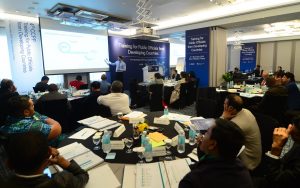 Following the 4th Seminar on Climate Change Projects and Programs (CCPP) on 5th November with more than 200 participants, the 4-day CCPP training with public and private sector representatives from more than 20 countries concluded with a series of site visits on Friday, 9th November. Co-organized by the Global Green Growth Institute, the training gave participants an opportunity to share their experience and learn about strategies to access climate finance, develop climate change projects and an enabling environment for climate investments.
Following the 4th Seminar on Climate Change Projects and Programs (CCPP) on 5th November with more than 200 participants, the 4-day CCPP training with public and private sector representatives from more than 20 countries concluded with a series of site visits on Friday, 9th November. Co-organized by the Global Green Growth Institute, the training gave participants an opportunity to share their experience and learn about strategies to access climate finance, develop climate change projects and an enabling environment for climate investments.
Participants appreciated the open exchange of ideas and experiences, highlighting especially the training focus on accessing support for the development of climate change projects. Presenters from the Green Climate Fund, Global Green Growth Institute, Green Technology Center, Climate Change Center and Korea Environmental Industry and Technology Institute shared insights on existing funding windows, available technical support and recent examples of well-designed climate projects. The availability of funding for climate change projects was explored in detail with topics ranging from establishing a strategic, programmatic approach to attracting climate investments to recommendations on private sector engagement. Summarizing the training outcomes, Margaret Kim, Head of the GCF Liaison Unit at GGGI, stressed the need to unlock private finance: “Mobilizing private sector engagement is critical to overcoming challenges of insufficient climate funding that country representatives have described during the training. The Green Climate Fund can help countries leverage the available funds to attract private capital many times over.”
Participants acknowledged the need for more capacity building to improve government engagement with private capital for climate change investments. Presenters from the private sector such as Korea Development Bank and Korea Technology Finance Corporation (KOTEC) emphasized the role private capital can play in the implementation of countries’ climate change ambitions through technical assistance, technological innovations or investments that are in partnership with the country. The support of green start-ups and Micro, Small & Medium Enterprises (MSME) was highlighted and the pros and cons of different funding modalities discussed. For example, the technology appraisal service of KOTEC provides the foundation for the selection of its financing solutions such as loan guarantees, which encourages SMEs with climate technologies to utilize their technologies as intangible assets and as a source of funding.
Going forward, participants suggested that the 5th Seminar on Climate Change Projects and Programs increases the scope of countries and public and private sector representatives attending the training to integrate a more diverse set of views and experiences on climate projects and programs. The training ended with a visit of project sites that apply latest climate technology to lower GHG emissions.